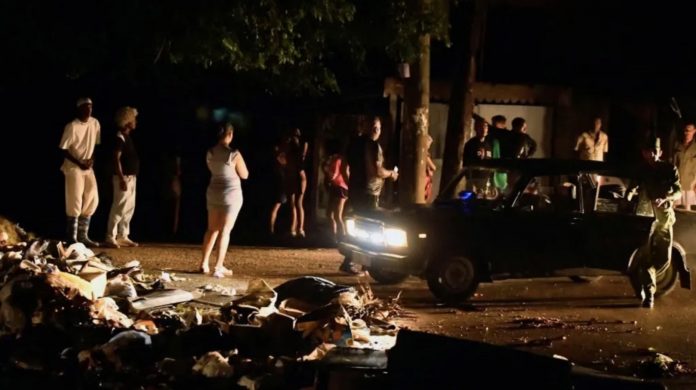เฮอริเคนออสการ์พัดเข้าถล่มภาคตะวันออกของคิวบา ด้วยความเร็วลมเกือบ 80 ไมล์ต่อชั่วโมง (130 กิโลเมตรต่อชั่วโมง) ในขณะที่ประเทศยังคงประสบปัญหาไฟฟ้าดับทั่วประเทศเป็นวันที่สาม
เมื่อวันศุกร์ที่ผ่านมา โรงไฟฟ้าหลักของเกาะล้มเหลว ส่งผลให้ประชาชนกว่า 10 ล้านคนไม่มีไฟฟ้าใช้ แม้ว่าจะมีการฟื้นฟูบางส่วนในวันเสาร์ แต่กลับเกิดปัญหาอีกครั้งจนทำให้ไฟฟ้าดับซ้ำ
รัฐมนตรีว่าการกระทรวงพลังงานและเหมืองแร่ บิเซนเต เด ลา โอ เลวี กล่าวว่ากระแสไฟฟ้าจะได้รับการฟื้นฟูให้ประชาชนส่วนใหญ่ภายในคืนวันจันทร์ ส่วน “ลูกค้ารายสุดท้ายอาจจะได้รับบริการไฟฟ้าภายในวันอังคาร”
เฮอริเคนระดับ 1 พัดเข้าฝั่งใกล้เมืองบาราโกอา เมื่อเวลา 17:50 น. ตามเวลาท้องถิ่น (21:50 น. ตามเวลา GMT) โดยศูนย์เฮอริเคนแห่งชาติของสหรัฐเตือนถึงความเป็นไปได้ของน้ำท่วมฉับพลันและดินถล่มในพื้นที่ทางตะวันออกของคิวบา
หลายคนที่อยู่ในพื้นที่ได้รับผลกระทบจากไฟฟ้าดับต้องทนกับการไม่มีเครื่องปรับอากาศหรือพัดลมเป็นเวลาหลายวัน อาหารเริ่มเน่าเสียในตู้เย็น บางครอบครัวต้องหันไปใช้ฟืนในการทำอาหาร น้ำก็ไม่สามารถใช้งานได้เนื่องจากต้องพึ่งพาปั๊มน้ำที่ใช้ไฟฟ้า ความอดทนของประชาชนเริ่มหมดลง ซึ่งเห็นได้จากความคิดเห็นบนโซเชียลมีเดีย
สถานการณ์ยิ่งวิกฤตมากขึ้น โดยโรงเรียนและธุรกิจหลายแห่งต้องปิดทำการ ขณะที่หลายคนกังวลว่าโรงพยาบาลอาจจะไม่สามารถทำงานต่อไปได้ในสภาพเช่นนี้
มีความกังวลว่าเฮอริเคนลูกใหญ่จะสร้างความเสียหายให้กับโครงสร้างพื้นฐานด้านพลังงานที่เสื่อมโทรมของคิวบา
ประธานาธิบดีมิเกล ดิแอซ-กาเนล กล่าวเมื่อวันเสาร์ว่า เจ้าหน้าที่ในพื้นที่ทางตะวันออกของเกาะกำลัง “ทำงานอย่างหนักเพื่อปกป้องประชาชนและทรัพยากรทางเศรษฐกิจ เนื่องจากเฮอริเคนออสการ์กำลังจะมาถึงอย่างหลีกเลี่ยงไม่ได้”
การไฟดับทั่วเกาะเมื่อวันศุกร์เกิดขึ้นหลังจากโรงไฟฟ้าแอนโตนิโอ กีเตราส ในมาตันซาส ซึ่งเป็นโรงไฟฟ้าที่ใหญ่ที่สุดของเกาะ หยุดทำงานในเวลาประมาณ 11:00 น. ตามเวลาท้องถิ่น
ประธานาธิบดีคิวบาได้กล่าวโทษการคว่ำบาตรจากสหรัฐที่ดำเนินมายาวนาน ว่าทำให้การจัดหาวัสดุและอะไหล่ที่จำเป็นต่อการซ่อมแซมไม่สามารถมาถึงได้ตามความต้องการ
บรูโน โรดริเกซ รัฐมนตรีว่าการกระทรวงการต่างประเทศของคิวบาได้กล่าวย้ำคำพูดของประธานาธิบดีในภายหลัง โดยโพสต์ข้อความบนโซเชียลมีเดีย X ว่า “หากยกเลิกการคว่ำบาตร ไฟฟ้าจะไม่ดับ และนี่คือวิธีที่รัฐบาลสหรัฐจะสามารถช่วยเหลือชาวคิวบา…ถ้าเขาต้องการ”
นอกจากนี้ คิวบายังประสบปัญหาการขาดแคลนน้ำมันเชื้อเพลิงที่สำคัญจากเวเนซุเอลาในปีนี้ด้วย
เมื่อวันศุกร์ เจ้าหน้าที่คิวบาประกาศให้โรงเรียนทั้งหมดและกิจกรรมที่ไม่จำเป็น รวมถึงสถานบันเทิงยามค่ำคืน หยุดดำเนินการจนถึงวันจันทร์ พร้อมทั้งขอความร่วมมือให้พนักงานที่ไม่จำเป็นทำงานจากบ้าน เพื่อประหยัดการใช้พลังงานไฟฟ้า ขณะที่บริการของรัฐบาลที่ไม่จำเป็นถูกระงับชั่วคราว
“มันบ้ามาก” เอโลย ฟอน ชายวัย 80 ปีที่เกษียณแล้วและอาศัยอยู่ในฮาวานากลาง ให้สัมภาษณ์กับสำนักข่าว AFP “มันแสดงให้เห็นถึงความเปราะบางของระบบไฟฟ้าของเรา… เราไม่มีสำรอง ไม่มีสิ่งใดที่จะช่วยพยุงประเทศได้ เรากำลังอยู่ไปวัน ๆ”
บาร์บารา โลเปซ วัย 47 ปี ผู้ผลิตเนื้อหาดิจิทัล กล่าวว่าเธอ “แทบไม่ได้ทำงานมา 2 วันแล้ว”
“นี่แย่ที่สุดในรอบ 47 ปีที่ฉันเคยเจอ พวกเขาทำพลาดอย่างแรง… เราไม่มีทั้งไฟฟ้าและอินเทอร์เน็ตมือถือ” เธอกล่าว
นายกรัฐมนตรีมานูเอล มาเรโร กล่าวกับประชาชนในแถลงการณ์ทางโทรทัศน์เมื่อวันพฤหัสบดีว่าโครงสร้างพื้นฐานที่เสื่อมโทรม การขาดแคลนน้ำมัน และความต้องการใช้ไฟฟ้าที่เพิ่มขึ้น เป็นสาเหตุสำคัญของปัญหาไฟฟ้าดับครั้งนี้
“การขาดแคลนน้ำมันเป็นปัจจัยที่สำคัญที่สุด” เขากล่าว
อัลเฟรโด โลเปซ วัลเดส ผู้อำนวยการสหภาพไฟฟ้าแห่งชาติ (UNE) ยอมรับว่าเกาะนี้กำลังเผชิญกับสถานการณ์พลังงานที่ท้าทาย โดยเฉพาะปัญหาการขาดแคลนเป็นตัวการสำคัญ
การไฟฟ้าดับเป็นระยะเวลานาน โดยเฉพาะเมื่อเกิดขึ้นทั่วเกาะ เป็นช่วงเวลาที่อ่อนไหวสำหรับรัฐบาลคิวบา เพราะความสามารถในการรักษาไฟฟ้าให้ใช้ได้ถือเป็นปัญหาทางความมั่นคงของสาธารณะ
ในเดือนกรกฎาคม 2021 ผู้ประท้วงนับพันคนได้ออกมาบนท้องถนนหลังเกิดไฟฟ้าดับหลายวันในพื้นที่ส่วนใหญ่ของประเทศ
รัฐบาลคิวบารับรู้มากขึ้นว่าคนในประเทศจำนวนมากเริ่มไม่เกรงกลัวในการพูดถึงปัญหาต่าง ๆ ในชีวิตประจำวันของพวกเขา หลายคนยังพร้อมที่จะออกมาประท้วงและตะโกนคำขวัญต่อต้านรัฐบาล หากสภาพความเป็นอยู่ยังไม่ดีขึ้น
ในเดือนมีนาคมที่ผ่านมา ประชาชนหลายร้อยคนในซานติอาโก เมืองใหญ่อันดับสองของคิวบา ได้ออกมาประท้วงปัญหาไฟฟ้าดับและการขาดแคลนอาหาร
Hurricane Oscar hits Cuba as it struggles with power outage
Hurricane Oscar has made landfall in eastern Cuba, packing winds of nearly 80mph (130km/h) on the third day of a nearly nationwide power outage.
On Friday, the island’s main energy plant failed and knocked out electricity for 10 million people. Supply was partially restored on Saturday, before collapsing again.
Energy and Mining Minister Vicente de la O Levy said power would be restored for most by Monday night, while “the last customer may receive service by Tuesday”.
The category 1 hurricane made landfall near the city of Baracoa at 17:50 local time (21:50 GMT), and could cause flash-flooding and mudslides in eastern areas, according to the US National Hurricane Center.
For many people since the outages began, it has been a few days with no air conditioning or fan. Food is now beginning to rot in fridges, and some families are having to cook with firewood. Many homes are without water as the supply depends on electric pumps.
Patience is wearing thin, certainly as expressed by many on social media.
It is an increasingly critical situation, with schools and businesses closed and fears for the continued functioning of hospitals.
There are fears that a significant storm would damage Cuba’s creaking energy distribution infrastructure.
President Miguel Diaz-Canel said on Saturday that authorities in the east of the island were “working hard to protect the people and economic resources, given the imminent arrival of Hurricane Oscar”.
Friday’s total blackout came after the Antonio Guiteras power plant in Matanzas – the largest on the island – went offline around 11:00 local time.
The communist president has blamed the decades-long US embargo for preventing much needed supplies and replacement parts from reaching Cuba.
Cuban Foreign Minister Bruno Rodríguez later echoed the president’s words, posting on X that “if the embargo is lifted, there will be no blackouts. This way the US government could support the Cuban people… if it wanted to”.
Cuba has also been hit this year by a drop in crucial fuel shipments from Venezuela.
On Friday, Cuban officials announced that all schools and non-essential activities, including nightclubs, were to close until Monday.
Non-essential workers were urged to stay home to safeguard electricity supply, and non-vital government services were suspended.
“This is crazy,” Eloy Fon, an 80-year-old pensioner living in central Havana, told the AFP news agency.
“It shows the fragility of our electricity system… We have no reserves, there is nothing to sustain the country, we are living day to day.”
Bárbara López, 47, a digital content creator, said she had already “barely been able to work for two days”.
“It’s the worst I’ve seen in 47 years,” she said. “They’ve really messed up now… We have no power or mobile data.”
Prime Minister Manuel Marrero addressed the public in a televised message on Thursday, blaming deteriorating infrastructure, fuel shortages and rising demand for the electricity failures.
“The fuel shortage is the biggest factor,” he said.
The head of the National Electric Union (UNE) Alfredo López Valdés also acknowledged the island had been facing a challenging energy situation, with shortages chiefly to blame.
Extended blackouts – particularly one this widespread – are always a tense time in Cuba.
In part, because the ability to keep the lights on represents a potential public order issue for the Cuban government.
In July 2021, thousands of protesters spilled into the streets in demonstrations sparked by days-long blackouts in much of the country.
The Cuban government has become increasingly aware that many on the island have lost a degree of fear over speaking out about the many daily problems they face.
Some are even prepared to take to the streets and chant anti-government slogans, if conditions merit it.
In March, Hundreds of people in Cuba’s second-largest city, Santiago, staged a rare public protest over chronic power blackouts and food shortages.
By Will Grant and Maia Davies, BBC News

















